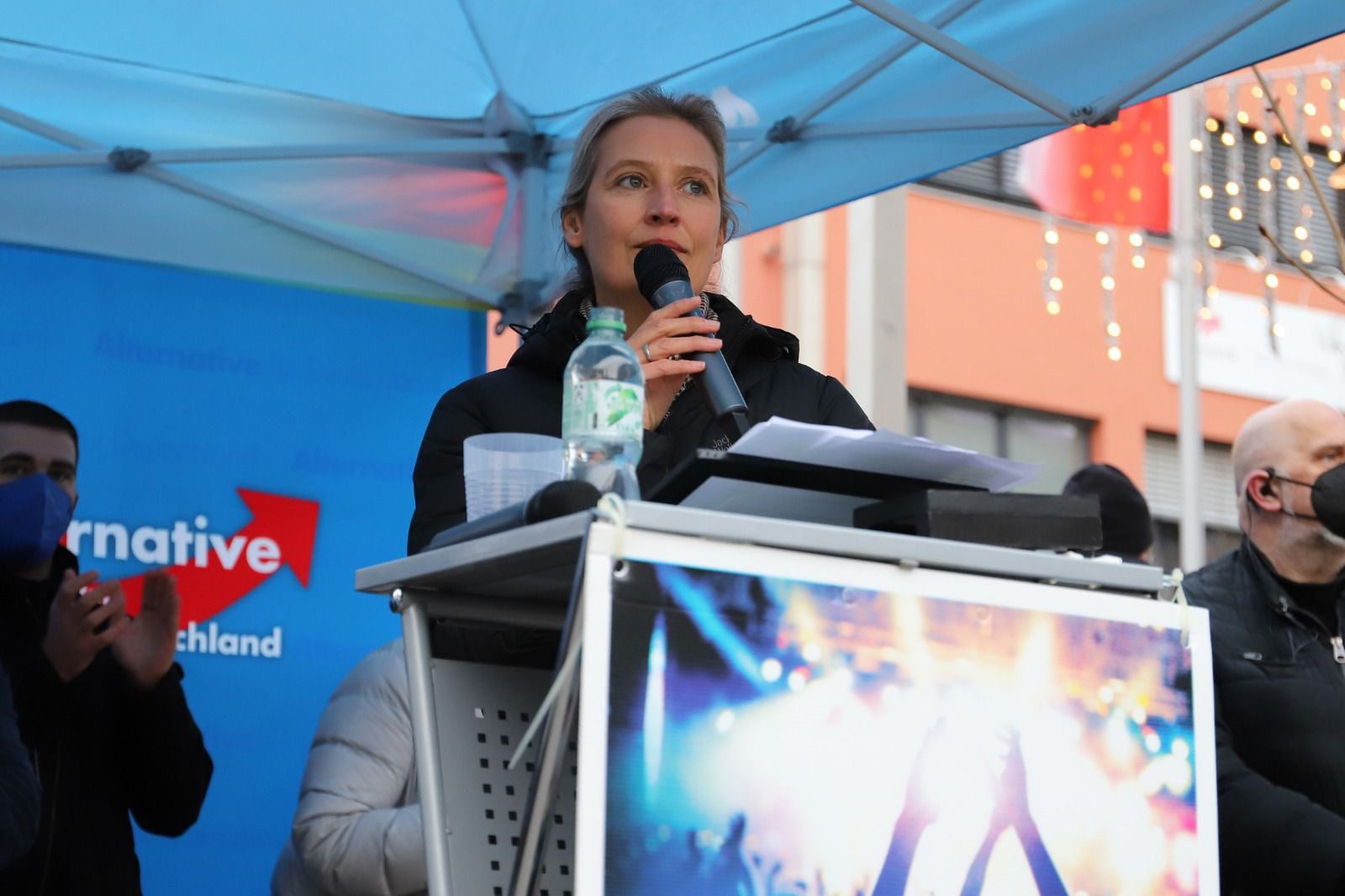
Alternative für Deutschland (AfD) Chairwoman Alice Weidel is looking to consolidate and expand the party’s support base in East Germany, which is already sky-high, in the year ahead, saying that it is “absolutely realistic” to participate in the state governments of Brandenburg, Thuringia, and Saxony following parliamentary elections in 2024.
During comments given to Deutsche Presse-Agentur (DPA), Weidel said: “We are already preparing for the super elections in East Germany in 2024,” adding that this is “strategically relevant because this is when [the party] is aiming to participate in its first government in an eastern German state,” the Berlin-based newspaper Junge Freiheit reports.
The AfD chief, who leads Germany’s sole conservative, anti-globalist party alongside Tony Chrupalla, when asked whether the party’s planned participation in the state governments is practical in light of the fact that the Christian Democratic Union (CDU) has ruled out any collaboration with them in the past, she said: “I think it’s absolutely realistic.” She added: “You cannot continue to refuse that forever.”
Presently, in Saxony, the AfD and CDU collectively represent two-thirds of the state’s electorate.
Per the latest opinion survey, carried out by research institute INSA, the AfD is the strongest force in Brandenburg, at 25%, followed by the left-liberal SPD, at 22%, and the CDU at 17%.
Sonntagsfrage zur Landtagswahl in Brandenburg (#ltwbb) • INSA/BILD: AfD 25 % | SPD 22 % | CDU 17 % | GRÜNE 11 % | DIE LINKE 10 % | BVB/FW 5 % | FDP 4 % | Sonstige 6 %
— Wahlrecht.de (@Wahlrecht_de) October 11, 2022
➤ Verlauf: https://t.co/lx41aRN9En
🗓️ Nächste Landtagswahl: vorauss. Sommer 2024 pic.twitter.com/3WFMdNLUY6
In Thuringia, the AfD also holds the top spot, at 25% of the vote, according to the latest INSA opinion poll. The national-conservative party is followed by Die Linke, at 23%, and the CDU at 21%.
🇩🇪 Thuringia | INSA
— PolitPro.eu Polls (@polit_pro_polls) November 10, 2022
AfD: 25% (-1)
Die Linke: 23%
CDU: 21% (+1)
SPD: 11%
Bündnis 90/Die Grünen: 7% (-1)
FDP: 5%
Bürger für Thüringen: 3% (+3)
Coalitions & Development:
➡️ https://t.co/dpeyKSveuq pic.twitter.com/ENRsJ7FudV
In Saxony, opinion surveys have also placed the AfD at the front of the pack, at 28%, while the CDU is poling a few points behind, at 25%.
As The European Conservative has previously reported, the AfD is now the strongest political force in East Germany.
If elections were held today, AfD would garner 27% of the total vote in the eastern federal states (Brandenburg, Mecklenburg-West Pomerania, Saxony, Saxony-Anhalt, and Thuringia), positioning them in first place, one percentage point ahead of the CDU.
BUNDESTAGSWAHL – Sonntagsfrage INSA/BILD
— Deutschland Wählt (@Wahlen_DE) September 26, 2022
Westdeutschland | Ostdeutschland
Union: 28% | 26%
GRÜNE: 21% | 14%
SPD: 19% | 15%
AfD: 12% | 27%
FDP: 8% | 7%
LINKE: 5% | 8%#btw #btw25 pic.twitter.com/sglSwbc1E8
In order to prepare the party for governance, Weidel said she plans on establishing “personnel development programs and internal training programs for good personnel.” This has priority “in order to be able to assume government responsibility. We have to build that up in a structured way like in a group,” she concluded.
Speaking exclusively to The European Conservative about the positive polling data and Weidel’s comment’s, AfD MP Petr Bystron, who also serves as the party’s foreign policy spokesman, said:
The vast majority of Germans want civic politics. This is also shown by the election results: Both in the Bundestag and in the majority of state parliaments, bourgeois coalitions of AfD with CDU/CSU and FDP or Free Voters could already govern.
The only thing that sabotages this will of the voters is the media-generated exclusion of the AfD, which, however, fewer and fewer people care about. As soon as the first state association of the CDU follows the will of the voters instead of the decreed opinion, we will govern.
